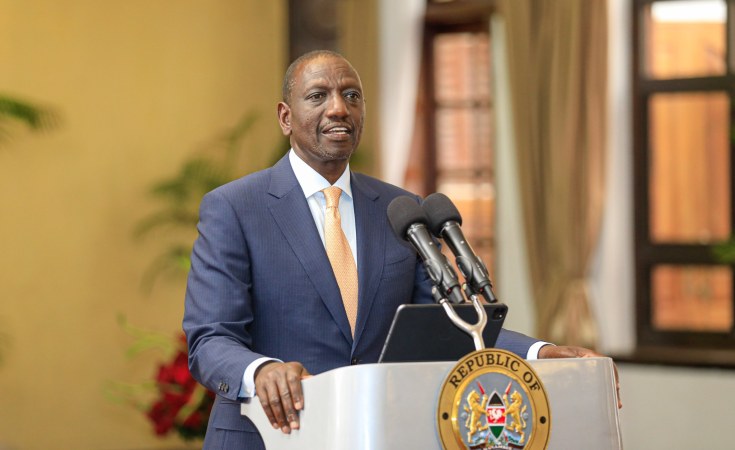NEW YORK: PRIME Minister Kassim Majaliwa represented President Dr Samia Suluhu Hassan at the opening ceremony of the Summit of the Future as part of the 79th United Nations General Assembly (UNGA79) at the UN headquarters in New York, on Sunday.
This year's UNGA is a crucial milestone in the global effort to accelerate progress towards the 17 Sustainable Development Goals (SDGs), with Tanzania expected to raise awareness about its clean cooking initiative among nations worldwide.
At last year's UNGA78, Vice-President Dr Philip Mpango emphasised the importance of dialogue in resolving conflicts to foster global solidarity and accelerate the implementation of the SDGs.
He called for urgent collective efforts to combat climate change by reducing greenhouse gas emissions and enhancing mitigation and adaptation measures.
Dr Mpango highlighted the alarming findings of the latest Assessment Report from the Intergovernmental Panel on Climate Change, indicating that the world is off-track to meet the 1.5-degree Celsius limit established in the Paris Agreement--a legally binding international treaty adopted at the UN Climate Change Conference (COP21) on December 12, 2015.
The 79th UNGA comes at a pivotal moment for Tanzania, which is implementing tangible initiatives for climate restoration, including the National Clean Cooking Energy Strategy.
This ten-year plan, launched by President Samia in May, is set to cost 4.6tri/- and aims to increase clean cooking energy usage from the current 10 per cent to 80 per cent by 2034.
Notably, during COP28 in Dubai, President Dr Samia launched the Africa Women Clean Cooking Support Programme (AWCCSP), advocating for clean cooking across the continent.
She emphasised that clean cooking energy is vital for climate change mitigation and inclusive sustainable development in Africa.
At UNGA79, Prime Minister Majaliwa is expected to highlight Tanzania's efforts in reducing carbon emissions and protecting the environment through the adoption of clean cooking practices.
ALSO READ: Tanzania pushes for Microfinance support in clean cooking initiative
He attended the opening ceremony alongside Heads of Government from approximately 193 countries and was scheduled to convey greetings from the Tanzanian government.
The summit's agenda includes discussions on trade, energy, economic development, the environment and issues concerning youth and children, as well as the impact of climate change.
Before the opening ceremony, Mr Majaliwa met with UN Secretary-General António Guterres to discuss cooperation between Tanzania and the UN. They addressed various topics related to defence, security and socio-political development.
In a media briefing after his discussion with Guterres, Mr Majaliwa stated that they focused on improving citizens' living standards by enhancing the availability of social services.
He also mentioned that Guterres commended Tanzania's historical role in supporting the liberation of several African nations, particularly those in the Southern African Development Community (SADC).
"Currently, our country continues to provide security support to several SADC and EAC nations," Mr Majaliwa noted. He expressed gratitude for Guterres's acknowledgment of Tanzania's contributions to peace and security on the continent.
Furthermore, Mr Majaliwa informed the UN Secretary-General about the upcoming local elections in Tanzania, scheduled for November, as well as the general election next year. He assured Guterres of the government's commitment to ensuring that all citizens can participate in the democratic process.
In promoting regional peace, Guterres praised Tanzania's efforts in restoring stability in Burundi, particularly its role in receiving refugees during past conflicts. He expressed satisfaction with the ongoing political stability in Burundi and encouraged the repatriation of refugees to their home country.
On the eve of UNGA79, Former Energy and Minerals Minister Professor Sospeter Muhongo, now a Member of Parliament for Musoma Rural, expressed optimism that Tanzania would advance its interests in executing the Clean Cooking Energy Strategy.
"I believe all nations will recognise Tanzania's tireless efforts to transition to clean cooking, as this transformative strategy is aligned with the global SDGs," Professor Muhongo told the Daily News.
International Relations Analyst Mr Medard Wilfred, based at St Augustine University of Tanzania (SAUT), emphasised that Tanzania's clean cooking initiatives would attract global attention. He noted that the strategy is essential for protecting the ozone layer from the adverse effects of unclean cooking energy sources like firewood and charcoal.
Mr Wilfred added that the country's clean cooking initiative aligns with the government's economic diplomacy, which is crucial for fostering bilateral partnerships with other nations to invest in renewable energy sources such as wind and solar power. The transition to clean cooking energy involves replacing unclean sources like firewood and charcoal with eco-friendly alternatives such as gas and electricity.


